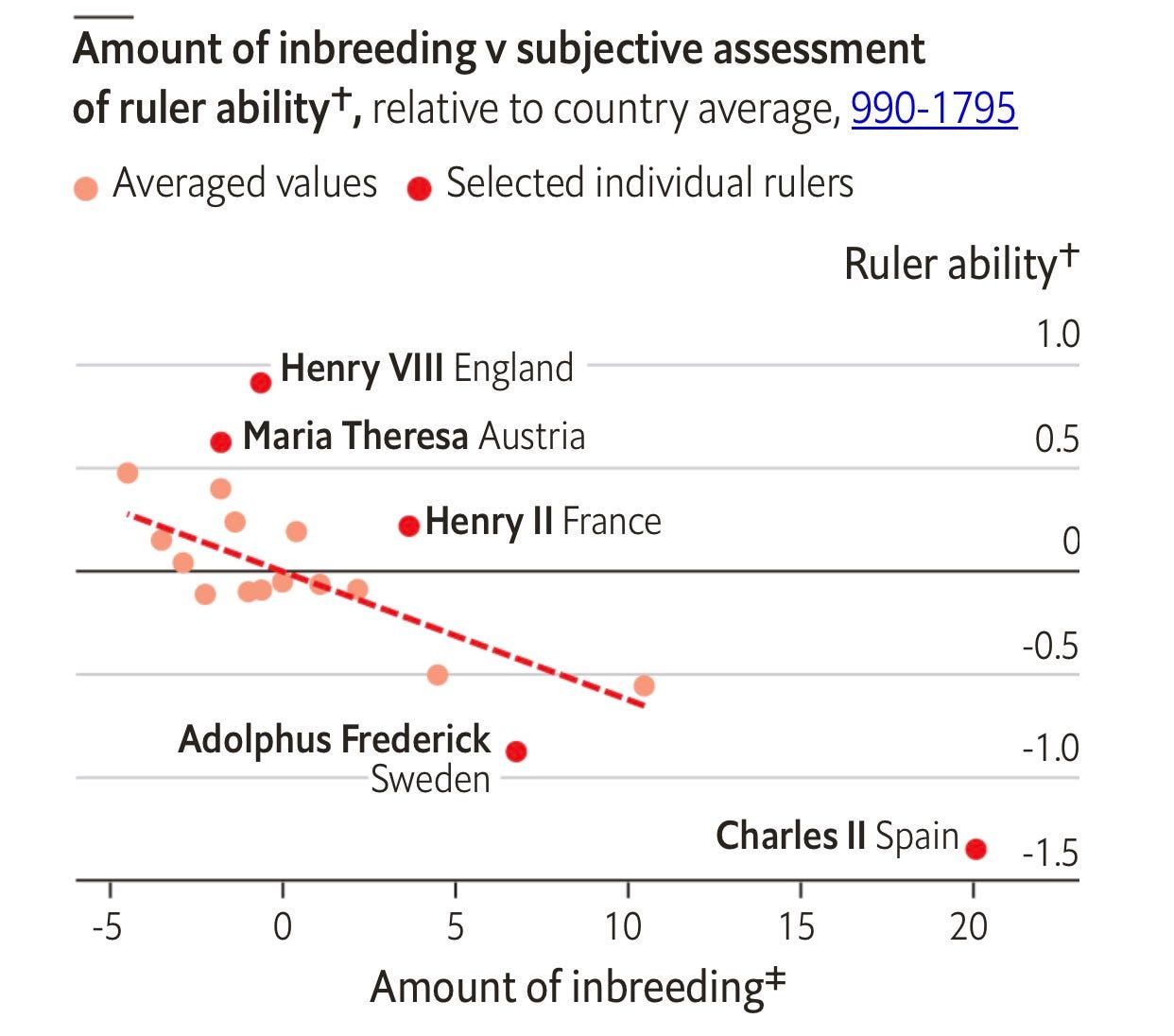Happy Friday!
I’m writing this from sunny Edinburgh, on a reporting trip around the Scottish elections. The main joy of this trip has been rediscovering great Scottish slang, for e.g. my new favourite word “wheesht,” which means “shut up”. So “wheesht for Indy” is basically “don’t criticise the SNP until we get independence.” Meanwhile, “women won’t wheesht” has become a GC feminist slogan.
Other phrases that won’t make it into the piece include the description of a tech-savvy Scottish nationalist as a “blockchain Nat,” plus the phrase “ah, he was STEAMING” for drunk. It has all reminded me that my Scottish grandad always used the word “peelie-wally” — meaning pale and sickly — to describe insufficiently brewed tea.
Helen
Graph of the week: The Hapsburg Line Has Ended!
(Source: “Data on inbred nobles support a leader-driven theory of history,” The Economist)
Prince Philip, A Man of his Time (Atlantic)
Once the initial, respectful tributes are over, Philip’s reputation will be as contested as that of Britain’s great wartime prime minister, Winston Churchill, whose early colonial career makes for uncomfortable reading. Philip was a man of his age. He was born into a world of deference and tradition that no longer exists: Greece has been a republic since 1973, while the heir to the Danish throne is married to an Australian marketing consultant. In 1937, the 16-year-old Philip walked through German streets for his sister’s funeral as onlookers gave Nazi salutes. His grandson Harry, meanwhile, married a biracial American actor, moved to California, and launched a podcast.
Prince Philip lived long enough that I wrote two obits for him: as well as this new Atlantic piece, the NS obit has a surprising amount about minor German royalty, which reminded me that I had prepped it several years ago. New blessing: may you outlive your obituarists.
All episodes of The Spark are now available as an audiobook, on Audible and Apple.
Quick Links
How the BBC transitioned from Radio 1’s Dance Anthems into the Prince Philip news. (Twitter)
A documentary tracks the “ACLU’s evolution from principled, nonpartisan defender of civil liberties into just another cog in the progressive machine.” As ever, this is a story about money. (Tablet)
“In 2021, on the other hand, a genuine gut-spiller from the First Fuckup, detailing in his own words all the major personal issues the right-wing media has tried and failed to weaponize for years — that had the potential to derail a presidency. Yet Hunter Biden’s ballad of the black sheep landed quietly in Washington.” (NYMag)
“Mr. Lavery already has about 1,800 paying subscribers to his Substack newsletter, The Shatner Chatner, whose most popular piece is written from the perspective of a goose.” Please nominate which animal you would like me to write this newsletter from next week. (NYT)
Both Jonathan and I initially refused to believe Prince Harry’s tribute to the Duke of Edinburgh was real. He might have been the Duke of Edinburgh, but he was the KING of the bants. A bantersaurus rex. Adam Bants. Bant and Dec. (Twitter.)
My HIGNFY was collateral damage in clearing the TV schedules for Philip obits. Here it is on iPlayer. Yes, I know that curling my hair makes me look like James II.
“Keir Starmer was having fun. It’s been a long time since it was much fun to sit on the Labour front bench.” Rob Hutton’s enjoyable sketch on the Greensill-themed PMQs. (The Critic)
Book Club Corner
In last week’s newsletter I solicited recommendations from readers, the replies to which told me a lot about the vibe I’m giving off.
Tom C suggests Dracula, helpfully adding “the original Bram Stoker one”, in case I had accidentally picked up a novelisation of Dracula: Dead and Loving It. The book is “really good. The epistolary format was loads of fun and it was surprisingly modern-feeling and fast-moving”.
Sarah A suggests The Beginning of Spring by Penelope Fitzgerald, an author who I am PRO because she only started at 60-ish. (Apologies to those of you who are 61 and over and therefore don’t find this consoling.)
Su B says The Dark Circle by Linda Grant: “a group of patients at a TB sanatorium just at the time when streptomycin became available as a cure.”
Lucy B says “anything by Russian writer Teffi, although it’s mostly short stories rather than novels, she is a hidden gem. She reminds me somehow of Decca Mitford.” SOLD.
Jim A says Satan Wants Me by Robert Irwin. “Starts off a la Adrian Mole/Bridget Jones, but filtered through Dennis Wheatley.”
Angela P says “No one that I have urged to read Cousin Phyllis by Elizabeth Gaskell has ever regretted it. Honestly, it's not the bonnet-y shit you might expect if you've ever come across Cranford—it’s an understated, exquisite gem of a book and has the bonus of being extremely short.”
Anne P says A Tale for the Time Being, Ruth Ozeki. “Absorbing meditation on time cleverly disguised as a very readable novel. Also fascinating about modern Japan.”
Clive M recommends Francis Spufford’s Light Perpetual, “which began astonishingly and goes on with flashes of the good stuff.”
I am delighted to report that only one Bluestockinger recommended their own book.
What’s that, Lassie? Recommending their own book? Never heard of it.







Absolutely. Also Rosamund Lehmann, Invitation to the Waltz, and The Weather in the Streets
Endorsing the Penelope Fitzgerald recommendation. I was going to suggest the same book too, (forgot), but any of her books are worth reading.